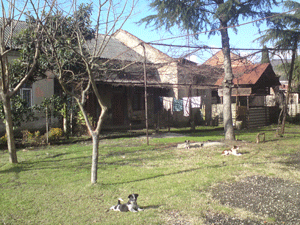Inga Gvasalia, Samegrelo
In the building of former boarding school in Senaki, as a result of the state strategy, the residence homes of IDPs in the compact centers are started to be rehabilitated and given to their ownership. But, as it has turned out, the residence homes of IDPs in the former dining & boiler rooms situated thereby won’t be renovated as it’s under the private ownership.
IDPs have been living since 1993 in the rooms of diner & boiler. On May 28th, 2002, these buildings and surrounding land was given to physical person Darejan Qavtaradze for 49 year term under the lease agreement. On June 23rd of 2006 the same person Darejan Qavtaradze bought 11721 sq. meter land and two units of buildings for 957 GEL. There is a receipt confirming the purchase of land and other real estate.
The IDPs living in the building under Darejan Qavtaradze’s ownership found out about the possessor of their house only now when the Municipal Development Fund started the rehabilitation of houses of compactly settled IDPs. Nobody was interested in the fate of IDPs living in the buildings of diner & boiler. Six families of IDPs living in two buildings were directly told that the buildings along with the land were under private ownership and their rehabilitation was not planned.
IDPs addressed local administrative organs, including Senaki Municipality Government, Office of Prosecutor, the Service of Labor and Public Health Protection, Veterans, Refugees and IDPs with the request of examining the situation and solving the problem but with no result so far.
“According to state program, we will offer the relevant residence places to the IDPs stage by stage. As for the concrete case, the IDPs must address the Ministry of Refugees and Accommodation. I can’t talk on behalf of them. Ministry might buy this object for them if the owner sells it for reasonable price,” – the head of the Service of Labor and Public Health Protection, Veterans, Refugees and IDPs Kote Basaria told us.
As IDPs state, this service offered the IDPs to move to another object, but they refused.
It’s interesting for what merit state sold the land and building for so cheap to Darejan Qavtaradze along with its IDPs?!
There is a presumption that two buildings of former boarding school and 11721 sq. meter area in reality belongs not to Darejan Qavtaradze, but her brother Raul Qavtaradze. Raul Qavtaradze has been a head of Education Department for years. This department is located exactly in the building of former boarding school.
Human Rights Center contacted Raul Qavtaradze who is assuring that both the land and two buildings belong to her sister.
In the description report we read that the land is of average quality with agricultural purposes.
Senaki Registration Service of the National Agency for Public Registry confirmed that this land is really registered under Darejan Qavtaradze’s name.
We didn’t receive the answer whether or not these two buildings belong to Darejan Qavtaradze’s ownership. The head of the service Zaza Arakhaia redirected us to the Land Management Service to get an answer on this question.
“According to law, Darejan Qavtaradze had a right on the direct purchase as she had made a lease agreement and had gone through all the procedures established by the law. I had no right not to sell her the land on the basis of presented documents. We didn’t violate any law,” – told us the head of regional agency of Samegrelo-Zemo Svaneti State Property Registration and Privatization, who was supervising the service of land management in 2006 in Senaki.
On the question why the land situated in the city was given the category of agricultural land and why the land was given under lease agreement to Qavtaradze, Kiknava responded: “This was not the prerogative of my service. I could not hinder her. My service is not the organ that checks whether or not the land has agricultural purpose.”
The change of the land’s category might be connected to the secret agreement between the officials and people interested in the land. In this way it would have been easier to obtain this land, considering that if the land had non-agricultural status, it would have been sold in auction and would have rather solid cost. The inference of the audit is questioned as well, where the buildings situated on this land are mentioned as ruins when there are IDPs still living there.
News
December 13, 2023
Ethnic minorities outside the peace dialogue
November 6, 2023
‘Peace’ agenda of political parties
Popular
Articles
February 13, 2024




